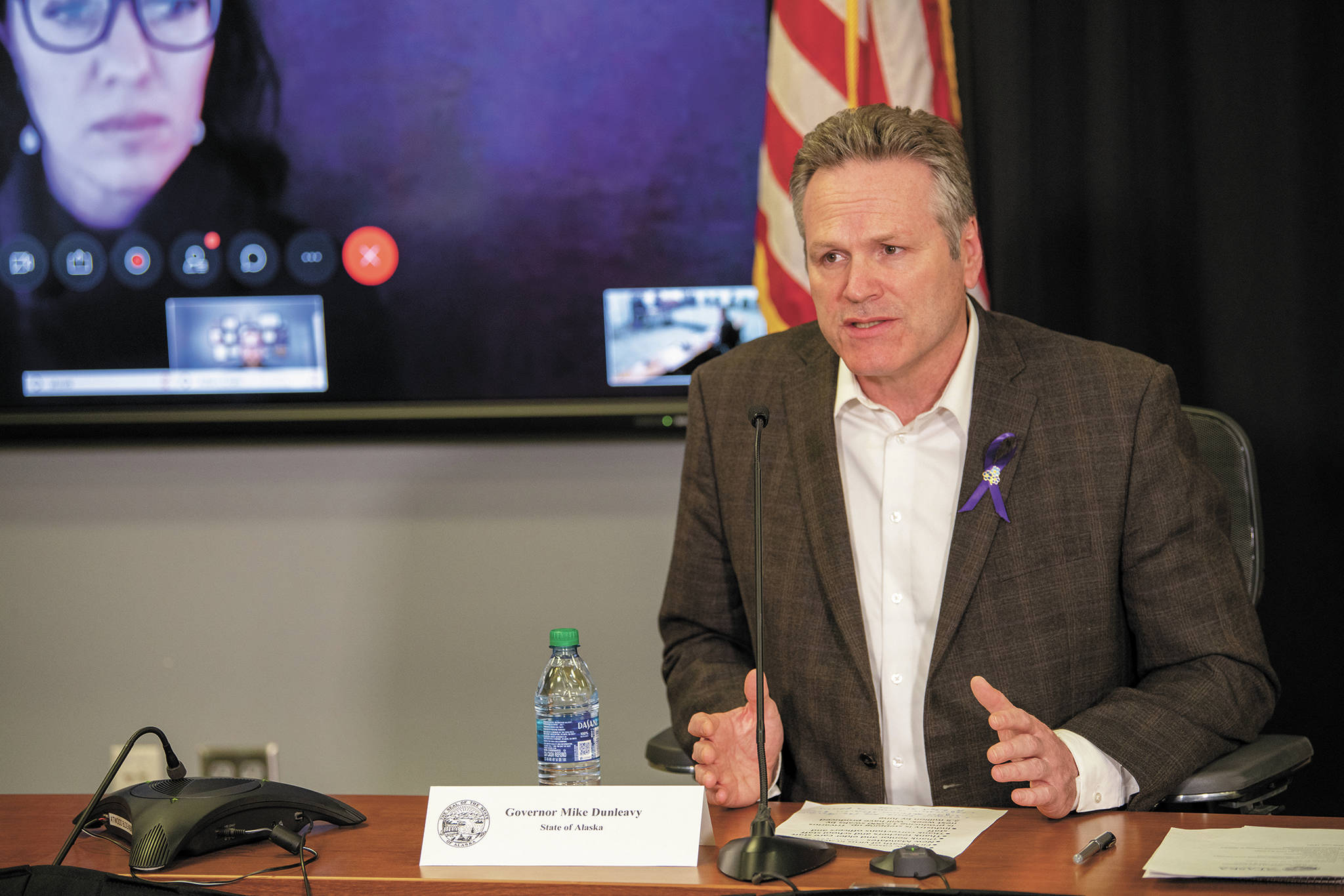With Alaska’s businesses and most other public entities set to reopen at full capacity on Friday, Gov. Mike Dunleavy and his administration are launching a series of virtual town halls to hear from more Alaskans during the ongoing novel coronavirus pandemic.
Dunleavy was joined Thursday in the first of these town halls, broadcast on his Facebook page, by Department of Health and Social Services Commissioner Adam Crum and Chief Medical Officer Dr. Anne Zink.
Phases three and four of the administration’s plan to reopen Alaska were posted online Thursday and detail the ways individual citizens and businesses can continue to protect themselves and their communities while the economy opens back up. During Thursday’s town hall, Dunleavy reiterated that the state has shifted to a “management” phase in dealing with the virus and that the state will not be enforcing mitigation measures.
“It’s philosophical,” he said. “Our country was built on a foundation of freedom, and what I mean by that is we elected a very long time ago to incorporate risk into our lives so that we’d have more freedom to live the lives that we want to live.”
Dunleavy said Alaskans have helped keep the state’s number of COVID-19 cases low by working together.
“But you don’t have to force Alaskans to work together — we work together,” he said.
Except for what the updated guidelines call “special populations,” all mandates for businesses and other entities have been changed to advisories. Crum expanded on this during Thursday’s town hall.
“This allows businesses to be much more responsive,” he said. “So in your communities, you can be responsive to and look at your different patron groups. Do you need to set aside some time for at-risk groups to come in, whether that’s early shopping hours through retail or specific dining hours? Those are specific items now that are free (for) communities and businesses to make.”
The “special populations” include those who work in fishing and seafood processing, health care and travel. Those sectors still have health mandates they must follow. Mandate 18, which sets rules for travel between Alaska communities, also remains in effect.
To read the full guidelines for phases three and four of reopening Alaska, visit https://covid19.alaska.gov/reopen/.
Zink and Dunleavy reiterated that moving through life with COVID-19 means Alaskans will need to make long-term, sustained lifestyle choices. People who are at risk know they’re at risk, Zink said. These are older people or those with underlying health conditions.
Questions submitted from the public included the topics of child care, antibody tests, widespread testing for the disease, and helping older populations in nursing homes and pioneer homes.
To the last point, Crum said DHSS is working with the Alaska Commission on Aging to develop a comprehensive plan for continuing to protect that vulnerable population while maintaining quality of life.
PFD
At the end of a Wednesday evening press conference, Dunleavy announced that Alaskans can expect their Permanent Fund Dividend payment to come in July rather than in October.
“The impacts on the economy are pretty evident and are growing.,” Dunleavy said during Thursday’s town hall when asked to address that.
Dunleavy said economists nationally and internationally have advised “interject(ing) cash into the economy as quickly as possible.”
“We already have that vehicle set up with the Permanent Fund,” he said. “Other states and the federal government, you know, they used other methods to get the money into the hands of … individuals from their states but we have that. So what authority I have under law was to move that date up. Usually it’s in October.”
COVID-19 by the numbers
Meanwhile, the state reported no new COVID-19 cases on Thursday. The total number of confirmed cases in Alaska rests at 402. There are also 12 cases for non-residents in Alaska who have the disease, seven of which are seafood industry workers.
So far, 356 Alaskans have recovered from the illness, and 39,545 tests have been conducted across the state.
Locally, South Peninsula Hospital has sent 788 samples out for testing as of Wednesday, according to the hospital’s website. Of those, 743 tests have come back negative, 40 are still pending and there have been a cumulative total of five positive tests from the hospital.
Reach Megan Pacer at mpacer@homernews.com.


